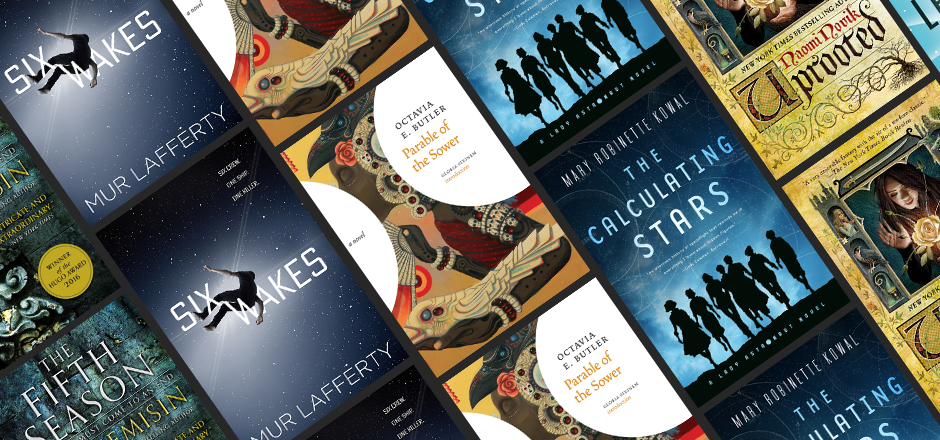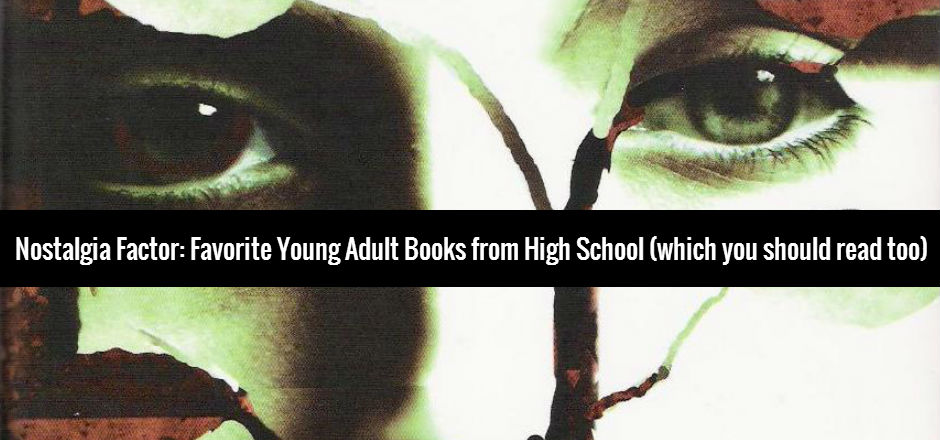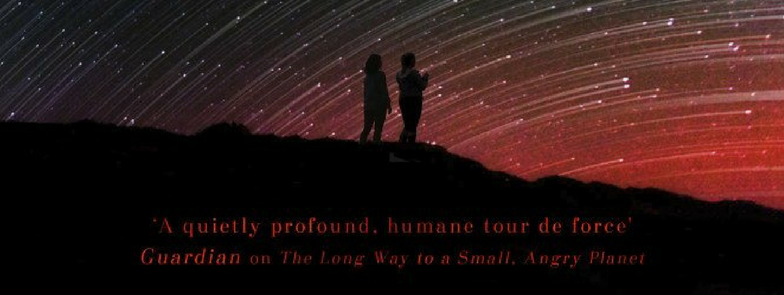This year, while working on setting up the first few book clubs of the new decade, it occurred to me that the Girls in Capes book club at Main Point Books has been running for six years.
Six (!) whole years.
A lot has changed since we first launched in January 2014 at Main Point Books’ original location in Bryn Mawr. We now meet at their new location in Wayne; we’ve added graphic novels to our lineup, and we’ve discussed books that run the course of SF/F across age groups and genres.
One thing that hasn’t changed, though, is that book club remains a great way for us to pass along recommended books. (Anyone who’s attended in the past two years, for example, has heard about Jade City.) Over time, though, I’ve worked with the staff at Main Point Books and the readers who attend our meetups to discover the best fit for us—books that end up sticking with us for months and even years afterward.
Here are 6 of the Girls in Capes Book Club’s favorite books from 2014 to 2019. For this list, I’m sticking with adult sci-fi & fantasy only—after all, young adult sci-fi & fantasy is its own entire list.
Six Wakes by Mur Lafferty (November 2017)
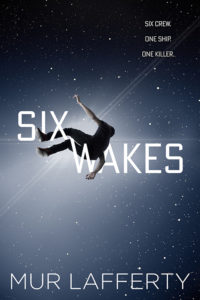 This standalone space opera was an almost shocking reader favorite, sticking with people far more than many of the other books we’ve discussed. People still occasionally mention this one when we meet.
This standalone space opera was an almost shocking reader favorite, sticking with people far more than many of the other books we’ve discussed. People still occasionally mention this one when we meet.
The members of a spaceship crew wake in their newly-cloned bodies—only to discover their slaughtered previous bodies strewn about the ship. Decades have passed, but none of them have retained any memories from those years past, and none of them have a clue who killed them.
And when they discover sabotage on board, they realize they have to figure out who killed them before the murderer can do it again.
The ethics of cloning, the philosophy of living virtually forever, and the potentially unlimited opportunities of technology combine in this sci-fi murder mystery.
Pitch to your book club:
- A science fiction murder mystery about clones
- Perfect if your club loves digging into sci-fi ethics
You can also read the Girls in Capes review here.
Parable of the Sower by Octavia Butler (April 2015)
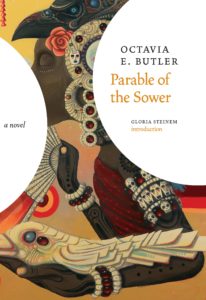 The GiC Book Club has covered nearly all of Octavia Butler’s novels (or at least the first in each series), but Parable of the Sower remains the reigning favorite. (Honorable mention goes to Kindred, which readers also enjoyed—though not quite as much as Parable.)
The GiC Book Club has covered nearly all of Octavia Butler’s novels (or at least the first in each series), but Parable of the Sower remains the reigning favorite. (Honorable mention goes to Kindred, which readers also enjoyed—though not quite as much as Parable.)
Lauren Olamina has spent her entire life living in a gated community as the world falls to pieces outside her neighborhood’s walls. When the walls come down, though, there’s nothing left to keep the danger on the outside.
As Lauren travels north with two neighbors seeking relief from the fires plaguing California, the seeds of her father’s Christianity and her own observations of the world grow into something new: a faith she describes as Earthseed.
Parable of the Sower remains startlingly relevant, and I selected the book for our December 2019 Amalgam Monthly Book Club pick in conjunction with Philly’s Million Year Picnic Book Club. It was an incredible discussion with around 15 participants, making this book an excellent choice for book clubs big and small.
Content warning: As Parable of the Sower is about a societal apocalyptic descent into chaos, the book contains multiple mentions of rape, murder, and cannibalism. The book isn’t especially descriptive, but the frequency of the mentions may be upsetting or triggering for your club’s readers.
Pitch to your book club:
- A near-future apocalyptic story dealing with climate change and natural disaster
- Contains fascinating philosophical interactions with religion in the face of instability
The Fifth Season by N.K. Jemisin (August 2016)
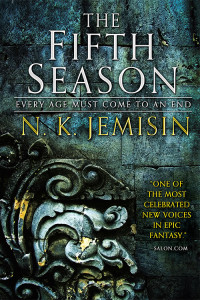 Another one of our readers’ favorite apocalypses takes place in N.K. Jemisin’s The Fifth Season, an award-winning fantasy series set in a world where an apocalyptic-level event is relatively commonplace, occurring every few centuries. The Fifth Season makes an excellent book club discussion for several reasons, including its second-person storytelling style—which can get pretty strong reactions from your readers.
Another one of our readers’ favorite apocalypses takes place in N.K. Jemisin’s The Fifth Season, an award-winning fantasy series set in a world where an apocalyptic-level event is relatively commonplace, occurring every few centuries. The Fifth Season makes an excellent book club discussion for several reasons, including its second-person storytelling style—which can get pretty strong reactions from your readers.
In the Stillness, people prepare for their entire lives to deal with apocalyptic catastrophes—and for orogenes, people gifted with the ability to slow or even halt the events, the Fifth Season can be even more fraught. Essun, an orogene, returns home as the Fifth Season begins to find her son dead and her daughter abducted—both of them at the hands of Essun’s husband, the children’s father.
Themes of ower, fear, oppression, and revolution infuse this novel with tons of great discussion points for your book club. The novel is the first in a trilogy, and if your book club is interested in continuing the series, each title has excellent discussion potential.
Pitch to your book club:
- A fantasy adventure driven by a mother’s search for her missing daughter
- Fantastic writing excellent for book clubs that enjoy picking apart writing style
The Left Hand of Darkness by Ursula K. Le Guin (November 2014)
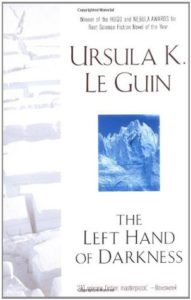 Our book club balances speculative fiction classics with more modern books. Outside of Octavia Butler’s novels, the most popular of the classic canon has been The Left Hand of Darkness by Ursula K. Le Guin.
Our book club balances speculative fiction classics with more modern books. Outside of Octavia Butler’s novels, the most popular of the classic canon has been The Left Hand of Darkness by Ursula K. Le Guin.
On the planet of Winter, inhabitants can choose and change their sex. The novel follows the human emissary’s diplomatic mission to Winter, where he’s forced to face his own prejudices when immersed in a culture that views sex and gender in a completely different way.
If your book club is looking for interesting classics, The Left Hand of Darkness makes an excellent choice. The book received both the Nebula and Hugo Awards; it’s also a great title to use in conjunction with Ann Leckie’s Ancillary Justice, which holds similar themes and was the first book to win the Hugo, Nebula, and Arthur C. Clarke awards in the same year.
Pitch to your book club:
- An award-winning sci-fi classic from a renown author
- Great for book clubs that like to delve into topics of cultural differences and gender studies
Uprooted by Naomi Novik (September 2016)
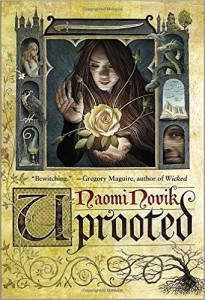 Possibly our most lively discussion of an adult fantasy title was the one for Naomi Novik’s Uprooted in September 2016. With the particular draws of the GiC Book Club for some readers, Uprooted has several elements that resulted in lively debate.
Possibly our most lively discussion of an adult fantasy title was the one for Naomi Novik’s Uprooted in September 2016. With the particular draws of the GiC Book Club for some readers, Uprooted has several elements that resulted in lively debate.
Everyone knows the wizard living near the Wood demands the companionship of a young woman every ten years in return for protecting the village from the dangers of the corrupted forest. And everyone knows the young women never truly return.
Agnieszka is convinced her beautiful and brave best friend Kasia will be taken in the next choosing. But when the wizard sets eyes on Agnieszka, everything will turn on its head.
Uprooted is a retelling of the fairy tale “Beauty and the Beast,” and as such contains themes that can be contentious in some book clubs. Our discussion of Uprooted was one of the most interesting we’ve had, and the book’s beautiful writing makes it fantastically worthwhile.
Pitch to your book club:
- A standalone fairy-tale retelling about what anchors us to home
- A fresh take on a familiar story
The Calculating Stars by Mary Robinette Kowal (January 2019)
 We have a lot of women in the sciences who attend our book club, and The Calculating Stars was one of our most popular books in 2019.
We have a lot of women in the sciences who attend our book club, and The Calculating Stars was one of our most popular books in 2019.
After a meteorite obliterates much of the United States’ East Coast, Elma York joins the International Aerospace Coalition’s efforts to put a man on the moon. But soon she starts to wonder why, with so many skilled women pilots and scientists involved with the IAC program, none of them are being considered as astronauts.
As Elma and the other women push for recognition, they face uphill battles all the way—and Elma is forced to face her own blind spots when it comes to the people who started lower on that hill in the first place.
The Calculating Stars is an alternate history sci-fi set in the 1950s and deals with many forms of discrimination. Among the women in the program, Elma is just about the only Jewish woman, and the program also includes several Black women who faced particular prejudices of the era different from the primarily gender-based ones Elma faces. The author includes a lengthy historical note at the end of the novel that discusses which points of the novel were altered history and which happened in real life, as well as a bibliography for further reading on the real history of the space race and how women were involved with it.
Pitch to your book club:
- An alternate history great for fans of Hidden Figures
- A great soft sci-fi for readers interested in the history of science
The Wrap-Up
While our readers tend to prefer fantasy overall, we discovered that it’s the science fiction books that truly stick with them. Many of the most impactful titles have been books dealing with topics that affect our readers in their daily lives: questions about whether innovative technologies are ethical, the potential of catastrophic climate crises, our interactions with gender and sexuality, the question of whether you can ever really go home once you’ve left.
In her 1976 introduction to The Left Hand of Darkness, added seven years after the novel’s original publication, Ursula K. Le Guin describes all of fiction—including science fiction—as metaphor and social commentary. “…when we’re done with it, we may find—if it’s a good novel—that we’re a bit different from what we were before we read it, that we have been changed a little, as if by having met a new face, crossed a street we never crossed before.”
Each book on this list has impacted the readers in our book club in just the way Le Guin describes. We try our best to introduce readers to new reads that can make a change in a reader, even if just in the slightest—and we hope these books will help make that change in you and the readers in your book club, too.
